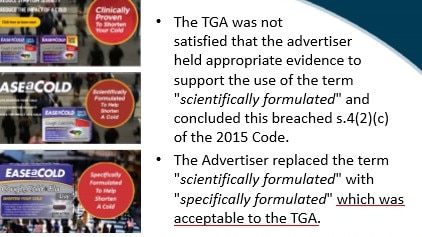Understaffed medicines watchdog struggling to ban dangerous products
Ten months after a dangerous supplement was rated for “critical” action it was still for sale and experts warn its putting the public at risk.
Health
Don't miss out on the headlines from Health. Followed categories will be added to My News.
Exclusive: Dangerous and shonky supplements that put consumers at risk are for sale because the nation’s medicines watchdog is failing to take meaningful action against dodgy products.
A new advertising complaint system that was meant to enable a crackdown on dangerous and false claims about complimentary medicines has failed to deliver with some products ranked as “critical priority” still on sale 10 months later.
The medicines watchdog received over 1460 complaints in 2018-19 generating 2436 cases (one complaint often mentioned multiple advertisers) but it failed to deal with four in 10 of the cases in KPI time frames.
Despite a complaint to the Therapeutic Goods Administration (TGA) in December last year a dangerous body building supplement called King Kong Stack that was being supplied against the law because it did not have TGA approval was still for sale until at least October 17.
Monash University student Lucy Romanoff who complained to the TGA about the supplement warned several ingredients such as cardarine “are so dangerous that they have been listed on the Australian Poisons Standard”.

In July Monash University Professor Ken Harvey complained to the TGA about Muscle Peptide Australia for selling prescription only products such as Clomid, Nolvadex and HCG and other unapproved SARMS and peptides.
In August, he complained about Peptides Direct Australia & NZ for selling “illegal, unapproved and potentially dangerous peptides, SARMS, prescription only drugs such as Tadalafil and prescription drugs approved by the FDA but not the TGA such as Bremelanotide.”
These substances were still being advertised for sale when News Corp checked this week.
Most of the complaints to the TGA (90 per cent) were ranked by the watchdog as “low priority” and even though they were found to be in breach of advertising rules they faced no real penalty other than an “educational” letter.
The TGA’s letters do not require a written response from the advertiser and the case is closed when the notice is sent, Professor Harvey said.
The TGA says “no formal investigation is conducted and the advertiser is not required to respond to the letter.”
“Under an assurance function the TGA selects a sample of low category cases (10-20 per cent) two months post-closure for review and checks whether the advertisement is now compliant in relation to the matters identified in the letter,” the agency said.
The TGA said highlighting the failure of the agency to deal with four in 10 complaints within KPI time frames was an over simplification and trivialised the TGA’s performance especially for those matters representing the greatest risk to public health and safety.

MORE HEALTH NEWS
Exposed: PBS drug subsidy numbers exaggerated
Breakthrough drugs approved for PBS will never be listed
The TGA which took over control of the complaint system in July last year is failing to meet timelines for dealing with complaints.
Consumers Health Forum CEO Leanne Wells said: “tougher penalties on dodgy advertising of these products are there for a reason and we would expect TGA to fully utilise them in the interests of consumer protection.
“We are concerned about TGA staff cut backs as it has the potential to compromise safety and quality.
“The new advertising Code gives the potential for more penalties but they are not used.”
Professor Harvey says when the TGA does take action, it fails to publish a comprehensive league table of the breaches it identifies or name the products and what action was taken.
EXAMPLES OF COMPLAINTS TO THE TGA:
*The TGA found advertising of the EASE A COLD products which claimed to be “scientifically formulated to shorten a cold” did not have enough evidence to support the claim but was happy when the advertisement was changed to state the product was “specifically formulated to help shorten a cold”.
*Complaints were submitted for ineffective weight loss products such as “FatBlaster” and “FatMagnet”.
*Complaints submitted for ineffective hangover products that Mr Harvey said encouraged unsafe drinking such as “Recoverthol”
*Complaint submitted for “medical foods” such as “Neurofolin” which claims to help manage depression
*Complaints submitted for the supplement BRIGHT BRAINS which claimed to give students an “unfair advantage”. It contains a chemical BOD68 which the company claimed was phytochemically comparable to the Bacopa monnieri a plant‐based Ayurvedic medicine. The rules say it’s only valid to extrapolate the results from clinical trials to a specific herbal product if they use identical, standardised extracts.
*Some dodgy products were removed from the market including a snake bite kit that recommended using razor blades and sucking out the venom, a management technique that was 20 years out of date.
*Peptide Clinics was issued with a $10 million fine for continuing to advertise products that could harm people but it went into liquidation before the fine was imposed.
Other products that have been the subject of complaints include ineffective weight loss products such as “FatBlaster” and “FatMagnet”.
Ineffective hangover products that encourage unsafe drinking such as “Recoverthol” and “medical foods” such as “Neurofolin” which claims to help manage depression were also the subject of complaints, as was a product called Bright Brains which claims to give students cramming for exams an “unfair advantage”.
Originally published as Understaffed medicines watchdog struggling to ban dangerous products
